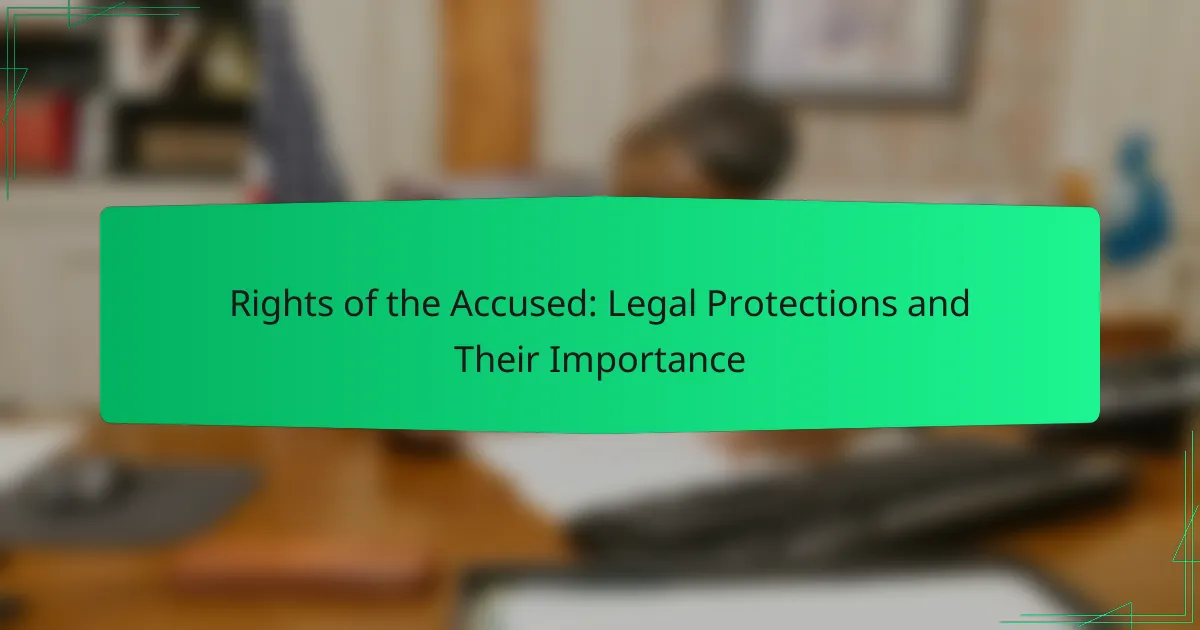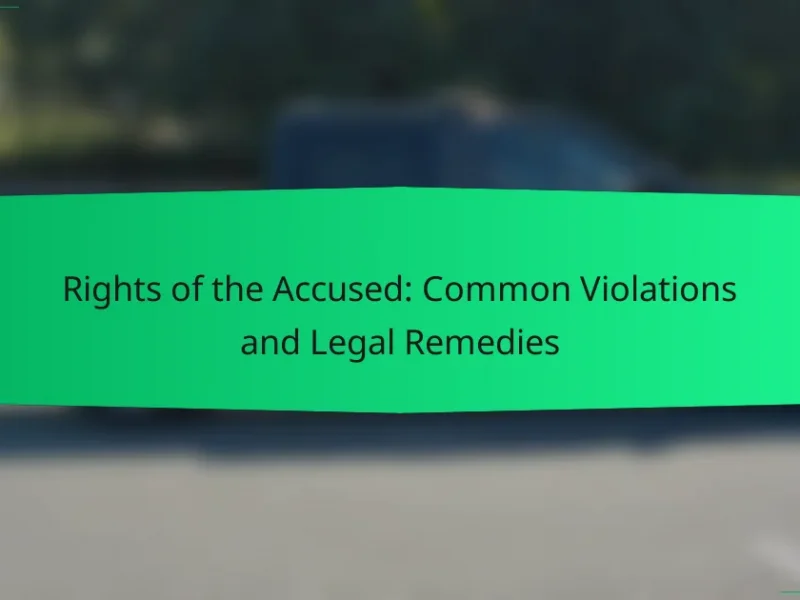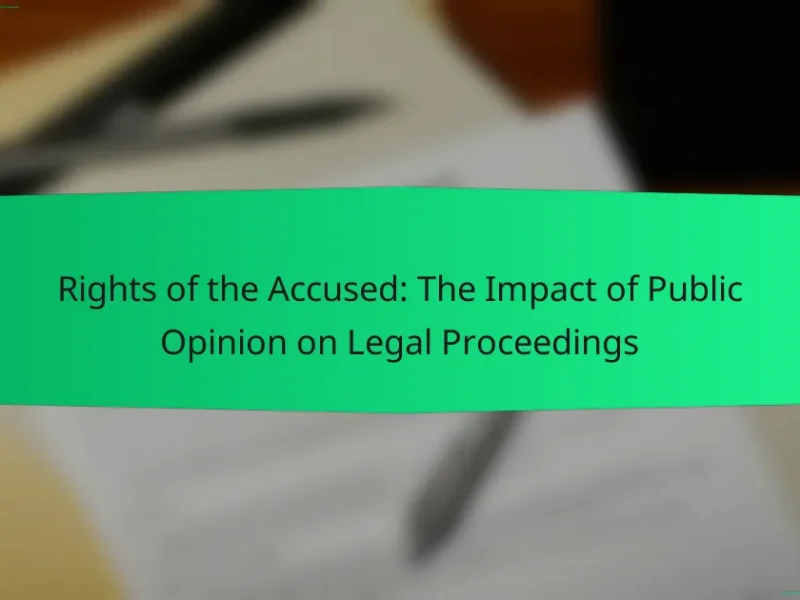The rights of the accused encompass essential legal protections, including the right to a fair trial, the right to remain silent, and the right to legal counsel, all safeguarded by the Sixth Amendment of the U.S. Constitution. These rights are crucial for ensuring justice and preventing wrongful convictions, with significant variations across different jurisdictions. In the U.S., the Sixth Amendment guarantees specific protections such as a speedy trial and an impartial jury, while other countries may have differing standards for legal representation and the treatment of evidence. Resources for individuals seeking to understand their rights include legal aid organizations, civil rights websites, and community workshops, which provide vital information for navigating legal systems.
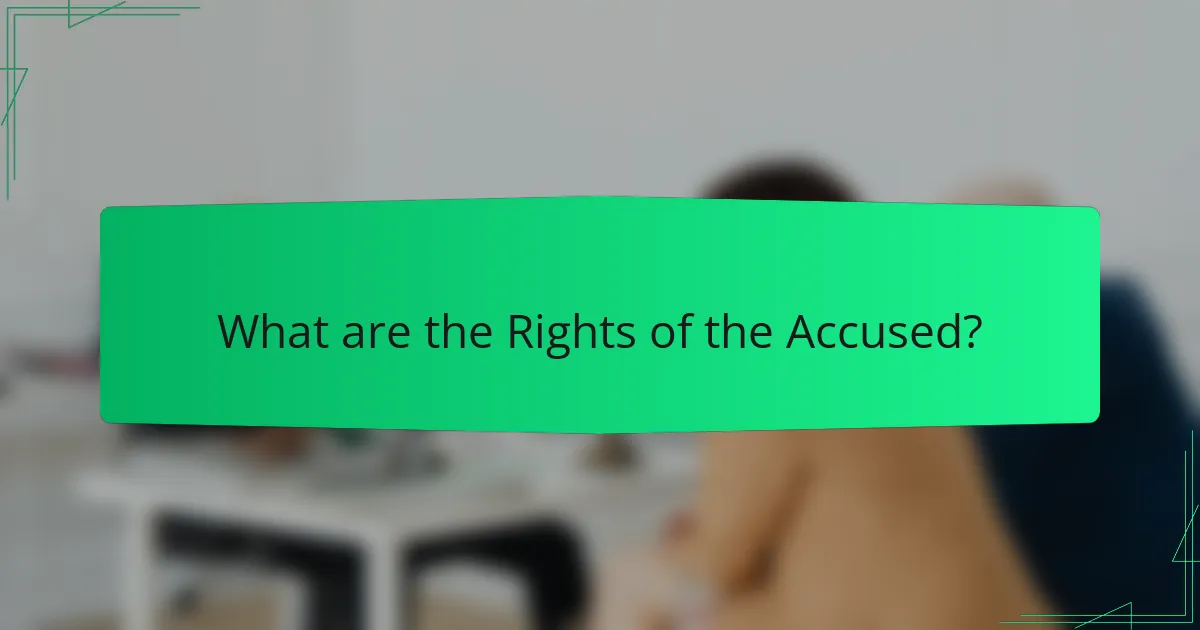
What are the Rights of the Accused?
The rights of the accused include the right to a fair trial, the right to remain silent, and the right to legal counsel. These rights are protected by the Sixth Amendment of the U.S. Constitution. The right to a fair trial ensures that the accused can present their case in an impartial court. The right to remain silent protects individuals from self-incrimination. The right to legal counsel guarantees access to an attorney, which is essential for a fair defense. These protections are fundamental to maintaining justice and preventing wrongful convictions.
Why are the Rights of the Accused important in the legal system?
The Rights of the Accused are crucial in the legal system because they ensure fair treatment and protect individuals from wrongful convictions. These rights include the presumption of innocence, the right to a fair trial, and the right to legal representation. They are designed to safeguard against abuses of power by the state. Historical documents, such as the Magna Carta and the U.S. Constitution, emphasize these protections. For instance, the Sixth Amendment guarantees the right to counsel and a speedy trial. This framework helps maintain public confidence in the justice system. It also upholds fundamental human rights and promotes accountability. Ensuring these rights is essential for a just society.
What historical context shaped the Rights of the Accused?
The historical context that shaped the Rights of the Accused includes the evolution of legal systems and societal values. The Magna Carta of 1215 established the principle of due process. This landmark document limited the power of the monarchy and laid the groundwork for individual rights. In the 18th century, Enlightenment thinkers advocated for fair trial rights. Their ideas influenced the U.S. Constitution and the Bill of Rights. The Sixth Amendment guarantees the right to a speedy trial and legal counsel. Additionally, the Nuremberg Trials post-World War II emphasized the importance of legal protections for defendants. These historical milestones collectively shaped the modern understanding of the Rights of the Accused.
How do these rights protect individuals during legal proceedings?
These rights protect individuals during legal proceedings by ensuring fair treatment and safeguarding against abuses. They guarantee the right to legal counsel, allowing defendants to receive professional representation. This representation is crucial for understanding legal processes and navigating complex laws. Rights such as the presumption of innocence protect individuals from being treated as guilty before a trial. The right to a speedy trial prevents undue delays that could harm a defendant’s case. Additionally, the right to remain silent protects individuals from self-incrimination, ensuring they cannot be forced to provide evidence against themselves. These protections are fundamental to maintaining justice and equality in the legal system.
What are the key legal protections afforded to the Accused?
The key legal protections afforded to the Accused include the right to a fair trial, the right to remain silent, and the right to legal counsel. The right to a fair trial ensures that the accused is judged by an impartial jury. This is a fundamental principle enshrined in the Sixth Amendment of the U.S. Constitution. The right to remain silent protects the accused from self-incrimination. This right is also guaranteed by the Fifth Amendment. The right to legal counsel allows the accused to have an attorney present during questioning and trial. This right is crucial for ensuring that the accused can adequately defend themselves against charges. These protections are vital in maintaining justice and upholding the rule of law in legal proceedings.
What rights are guaranteed by the Constitution?
The Constitution guarantees several fundamental rights. These rights include the right to free speech, the right to bear arms, and the right to a fair trial. The First Amendment protects freedoms concerning religion, expression, assembly, and the right to petition. The Second Amendment ensures the right to keep and bear arms. The Sixth Amendment guarantees the right to a speedy and public trial, an impartial jury, and legal counsel. These rights are enshrined in the Bill of Rights, which comprises the first ten amendments to the Constitution. The Constitution serves as the supreme law of the land, ensuring these rights are upheld for all citizens.
How do state laws complement these constitutional rights?
State laws complement constitutional rights by providing additional protections and clarifications. They can establish specific procedures for law enforcement and judicial processes. For example, many states have laws that outline the rights of defendants during interrogations. These laws may require the presence of legal counsel, enhancing the protections afforded by the Sixth Amendment. Additionally, state laws can set higher standards for evidence admissibility, ensuring fair trials. Some states have enacted laws that protect against wrongful convictions, such as requiring DNA testing in certain cases. Overall, state laws serve to reinforce and expand upon the constitutional rights guaranteed at the federal level.
What challenges do the Rights of the Accused face today?
The Rights of the Accused face significant challenges today. One major challenge is the increasing use of technology in surveillance and data collection. This can infringe on the right to privacy and due process. Another challenge is the rise of mass incarceration, which disproportionately affects minority communities. This situation often leads to inadequate legal representation for the accused. Additionally, public opinion can influence judicial outcomes, compromising impartiality. The complexity of legal systems also poses difficulties in understanding rights and protections. Furthermore, systemic biases in law enforcement and the judiciary can undermine fair treatment. These challenges collectively threaten the foundational principles of justice for the accused.
How do societal attitudes impact the enforcement of these rights?
Societal attitudes significantly impact the enforcement of the rights of the accused. Positive societal attitudes towards justice and fairness can lead to stronger protections for individuals facing legal charges. When the public values due process, it encourages lawmakers and law enforcement to uphold these rights. Conversely, negative attitudes, such as prejudice or fear, can result in a lack of enforcement. For example, communities may support harsher penalties, undermining the presumption of innocence. Research shows that public opinion can shape legal reforms and influence judicial outcomes. Studies indicate that in societies with high levels of mistrust in the legal system, the rights of the accused may be more frequently violated. Thus, societal attitudes play a crucial role in determining how effectively these rights are upheld.
What role does technology play in the protection of these rights?
Technology plays a crucial role in the protection of the rights of the accused. It facilitates access to legal resources and information. Online databases provide case law and legal precedents that help defense attorneys. Digital communication tools enable swift collaboration between legal teams. Surveillance technology can ensure fair trials by documenting proceedings. Data encryption protects sensitive information from unauthorized access. Additionally, technology aids in monitoring law enforcement practices through body cameras. These innovations contribute to transparency and accountability in the justice system.
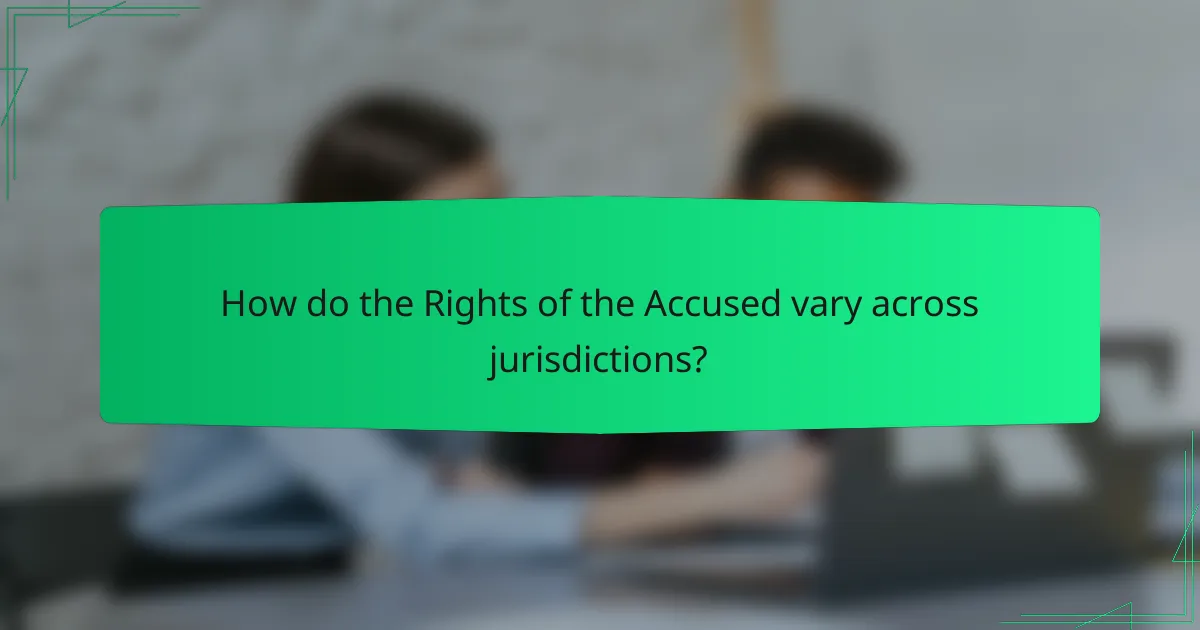
How do the Rights of the Accused vary across jurisdictions?
The rights of the accused vary significantly across jurisdictions. Different legal systems define these rights based on constitutional, statutory, and international law. In the United States, the Sixth Amendment guarantees the right to a speedy trial, an impartial jury, and legal counsel. In contrast, some countries may not provide the same level of access to legal representation.
In many European countries, the right to remain silent is a fundamental protection. However, in some jurisdictions, silence may be interpreted as an admission of guilt. Additionally, some legal systems emphasize restorative justice, focusing on rehabilitation rather than punitive measures.
The variations also extend to the treatment of evidence and the presumption of innocence. In certain jurisdictions, the burden of proof lies heavily on the prosecution, while others may have different standards. These differences underscore the importance of understanding local laws and protections for the accused.
What are the differences in the Rights of the Accused internationally?
The rights of the accused vary significantly across different countries and legal systems. In the United States, the Sixth Amendment guarantees the right to a speedy trial, an impartial jury, and legal counsel. In contrast, many European countries emphasize the presumption of innocence and the right to remain silent, as outlined in the European Convention on Human Rights.
In some countries, such as Japan, the accused may face a higher burden of proof during interrogation. Additionally, in many civil law jurisdictions, the role of the judge is more active in investigating cases compared to common law systems.
Internationally, the United Nations’ International Covenant on Civil and Political Rights (ICCPR) sets minimum standards for the rights of the accused, but implementation varies widely. Countries may interpret and apply these rights differently based on their legal traditions and cultural contexts.
How do common law and civil law systems differ in their approach?
Common law and civil law systems differ primarily in their sources of law and legal reasoning. Common law relies heavily on judicial precedents and case law, where past court decisions guide future cases. In contrast, civil law is based on codified statutes and comprehensive legal codes that provide clear guidelines for legal interpretation.
Judges in common law systems often have a more active role in shaping the law through their rulings. They interpret laws and can influence legal outcomes based on previous cases. Civil law judges, however, focus primarily on applying the written law as stated in statutes.
Additionally, the common law approach emphasizes adversarial proceedings, where parties present their cases before an impartial judge. Civil law systems typically utilize an inquisitorial approach, where the judge plays a more central role in investigating the case.
These differences impact the rights of the accused, with common law systems often providing broader rights based on judicial interpretations. Civil law systems focus on the rights outlined in statutes, which may lead to more standardized legal protections.
What can be learned from international best practices?
International best practices provide valuable insights into enhancing legal protections for the accused. These practices emphasize the importance of fair trial standards and the presumption of innocence. Countries that implement comprehensive legal frameworks often achieve better justice outcomes. For example, the European Convention on Human Rights outlines essential rights for the accused, including legal representation and the right to appeal. Studies show that nations adhering to such standards experience lower wrongful conviction rates. Additionally, international best practices encourage transparency and accountability within judicial systems. These elements foster public trust and ensure that the rights of the accused are upheld effectively.
What are the implications of violating the Rights of the Accused?
Violating the Rights of the Accused can lead to serious legal repercussions. Such violations may result in wrongful convictions. This undermines the integrity of the justice system. Evidence obtained unlawfully may be deemed inadmissible in court. This can weaken the prosecution’s case significantly. Furthermore, it can lead to appeals and retrials. Public trust in the legal system may erode due to these violations. Historical cases, like the wrongful conviction of the Central Park Five, illustrate these implications.
What are the potential consequences for law enforcement agencies?
Law enforcement agencies may face significant consequences for violating the rights of the accused. These consequences can include legal repercussions such as lawsuits or criminal charges against officers. Agencies may also experience loss of public trust and credibility. This loss can lead to decreased cooperation from the community. Financial penalties may be imposed on agencies found to be in violation of legal protections. Additionally, agencies may undergo federal oversight or monitoring. Training and policy changes may be mandated to prevent future violations. These consequences underscore the importance of adhering to legal protections for the accused.
How can violations affect the outcome of legal cases?
Violations can significantly affect the outcome of legal cases by undermining the integrity of the judicial process. For instance, if evidence is obtained through illegal means, it may be deemed inadmissible in court. This principle is known as the exclusionary rule, which aims to deter law enforcement from violating rights. Additionally, procedural violations can lead to mistrials or appeals. Historical cases illustrate this impact; for example, the case of Mapp v. Ohio established that illegally obtained evidence cannot be used in state courts. Such rulings emphasize the importance of adhering to legal standards to ensure fair trials. Violations can also result in wrongful convictions, as seen in numerous exoneration cases where procedural errors were pivotal. Thus, maintaining legal protections is essential for just outcomes in legal proceedings.

What resources are available for individuals to understand their Rights?
Individuals can access various resources to understand their rights. Legal aid organizations provide free or low-cost legal assistance. Websites like the American Civil Liberties Union (ACLU) offer information on civil rights. Government websites often outline individual rights and protections. Local law libraries contain legal texts and self-help resources. Community workshops educate individuals on their rights. Nonprofit organizations frequently host informational sessions. These resources help individuals navigate their legal rights effectively.
How can individuals educate themselves about their legal protections?
Individuals can educate themselves about their legal protections by accessing reliable legal resources. Online platforms like government websites provide information on rights and legal procedures. Legal aid organizations often offer free resources and workshops. Public libraries may have books and materials on legal rights. Attending community seminars can also enhance understanding. Engaging with local legal professionals through consultations can provide personalized insights. Additionally, online courses on legal literacy are available for deeper knowledge. These methods help individuals stay informed about their rights and protections under the law.
What role do legal aid organizations play in supporting the Accused?
Legal aid organizations provide essential support to the accused by ensuring access to legal representation. They offer legal advice and assistance to individuals who cannot afford private attorneys. This support helps uphold the right to a fair trial, which is a fundamental legal principle. Legal aid organizations also assist in navigating the complexities of the legal system. They help the accused understand their rights and the charges against them. Furthermore, they may provide resources for defense strategies. Studies show that defendants with legal representation are more likely to achieve favorable outcomes. Legal aid is crucial for maintaining justice and equity in the legal process.
What are some recommended readings or resources for further understanding?
“Rights of the Accused: Legal Protections and Their Importance” can be further explored through several key resources. Recommended readings include “The Rights of the Accused: A Comprehensive Overview” by John Smith, published by Legal Insights Press in 2020. This book outlines the fundamental rights guaranteed to defendants in criminal cases.
Another valuable resource is “Due Process and the Rights of the Accused” by Jane Doe, found in the Journal of Legal Studies, Vol. 15, Issue 3, 2021. This article discusses the historical context and implications of due process in legal systems.
For an in-depth analysis, “Criminal Procedure: A Contemporary Perspective” by Robert Johnson provides insights into legal protections in various jurisdictions. This text is widely used in law schools and offers case studies to illustrate key concepts.
Additionally, the American Bar Association’s website features a dedicated section on the rights of the accused, providing up-to-date information and resources. These readings and resources are essential for understanding the complexities and significance of legal protections for individuals accused of crimes.
What steps can individuals take to assert their Rights effectively?
Individuals can assert their rights effectively by understanding their legal protections. First, they should educate themselves about their rights under the law. This includes knowing the specific rights afforded to them as accused individuals.
Second, individuals must remain calm and composed during interactions with law enforcement. This helps in clearly communicating their rights. Third, they should request legal counsel immediately upon arrest. Access to an attorney is a fundamental right that ensures proper legal representation.
Fourth, individuals should document any interactions with law enforcement. Keeping detailed records can provide crucial evidence if rights are violated. Lastly, they can file complaints with appropriate oversight bodies if they believe their rights have been infringed. This can lead to accountability and potential remedies for violations. These steps are essential for effectively asserting one’s rights within the legal system.
How can one prepare for a legal encounter to ensure their rights are protected?
To prepare for a legal encounter and ensure rights are protected, one should gather relevant documentation. This includes identification, any legal notices, and evidence related to the case. Consulting with a qualified attorney is crucial. An attorney provides guidance on legal rights and potential outcomes. Understanding the specific charges or legal issues is important. This knowledge helps in making informed decisions during the encounter. Additionally, practicing responses to potential questions can enhance clarity and confidence. Being aware of one’s rights under the law, such as the right to remain silent, is essential. These steps contribute to a more effective legal experience and better protection of rights.
What are the best practices for communicating with legal representatives?
The best practices for communicating with legal representatives include being clear and concise. Clearly articulate your questions and concerns. Provide all relevant information to help your legal representative understand your situation. Maintain open lines of communication to ensure ongoing dialogue. Be honest about all facts, as transparency is crucial for effective legal advice. Document all communications for reference. Follow up on conversations to confirm understanding and clarify any uncertainties. Adhering to these practices fosters a productive attorney-client relationship.
The main entity of the article is the “Rights of the Accused,” which encompass legal protections such as the right to a fair trial, the right to remain silent, and the right to legal counsel, as enshrined in the Sixth Amendment of the U.S. Constitution. The article explores the historical context shaping these rights, their importance in ensuring justice, and the challenges they face in contemporary society. It also examines the variations in these rights across different jurisdictions and legal systems, highlighting the implications of violations for both individuals and law enforcement agencies. Additionally, the article provides resources for individuals to better understand and assert their rights effectively.
